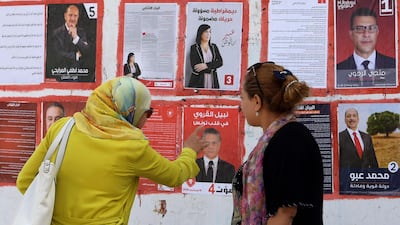A Tunisian security officer was killed in a clash with extremists on Monday as campaigning began for the presidential election this month, underlining the challenges facing the only democracy to emerge from the 2011 Arab uprisings.
National guardsmen and army troops were tracking a radical group in the Kef mountains near the Algerian border when shooting broke out, killing the national guard officer and three militants, state TV reported.
Tunisia has struggled to contain extremist violence since the overthrow of president Zine El Abidine Ben Ali in 201. The country's tourism sector, an important source of revenue for its struggling economy, is still struggling to recover from two attacks four years ago that killed dozens of tourists. Meanwhile, unemployment has risen from 12 per cent before the uprising to 15.2 per, and as much as 30 per cent in some cities. Dissatisfaction with government over the lack of jobs and development remains high in the country's impoverished interior.
Prime Minister Youssef Chahed, despite being widely blamed for the failure to improve the economy, is one of 26 candidates in the running for the presidency in the September 15 poll. The post would give him control over only foreign and defence policy under Tunisia's new constitution, while domestic affairs will be overseen by the next prime minister to emerge from parliamentary elections scheduled for October.
Several presidential candidates including Mr Chahed began their campaign at the stroke of midnight when the election season officially began, with the prime minister meeting hundreds of supporters in the impoverished Kabarya district of the capital Tunis.
The shortlist of approved candidates released on Saturday included businessman Nabil Karoui, the owner of the private Nesma television station, who was arrested last month on charges of money laundering and tax evasion and remains in detention.
His Heart of Tunis party says the charges are politically motivated. His supporters began putting up campaign posters and said they planned to stage a large rally in the southern city of Gafsa later on Monday.
Other prominent candidates include former president Moncef Marzouki, former prime minister Mehdi Jomaa, Defence Minister Abdelkarim Zbidi and parliament speaker Abdelfattah Mourou.
Mr Mourou is the first presidential candidate to be fielded by the moderate Islamist Ennahda party since 2011.
"It is the first time that Tunisians have no idea who will become their president," according to the Tunis-based Joussour think tank.
There were only two front runners in the last election in 2014 – Mr Marzouki and Beji Caid Essebsi, who ultimately won in a run-off vote. "Now everything is possible," Joussour said.
Caid Essebsi's death in July at the age of 92 caused the presidential election to be brought forward from November.
Political analyst Hamza Meddeb said he believed Mr Mourou would make it to the second round of voting expected to be held the first week of November.
"The big unknown is who will be his rival", Mr Karoui, Mr Chahed or Mr Zbidi, he told Agence France-Presse.
There only two women presidential candidates – former tourism minister Salma Elloumi and Abir Moussi, who heads a group formed from the remnants of Mr Ben Ali's ruling party.
Campaigning ends on September 13.

